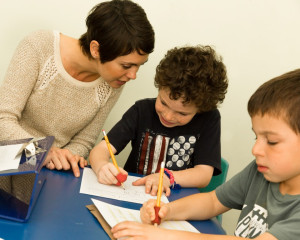Going Back to School – Be Prepared
Ready or not, here it comes! Back to school is a time of fun, new challenges, adventures and new friends, but it can also be a little stressful too, especially if kids aren’t readily prepared.
Preparation involves a lot more than shopping for new clothes, backpacks and lunch boxes. Children who are entering a new life stage – such as starting or going back to school – will have a smoother and easier transition when they are properly prepared for the new experience. This is even more crucial for students who experience sensory issues.  For children with Sensory Processing Disorder (SPD), the need to be proactively prepared is a must to minimize stress and ensure a peaceful entry or return to school. Take note and give your young ones the best start possible by following these simple tips, which can put them on the right track to embrace and excel in their new learning environment with the exciting challenges that lie ahead:
For children with Sensory Processing Disorder (SPD), the need to be proactively prepared is a must to minimize stress and ensure a peaceful entry or return to school. Take note and give your young ones the best start possible by following these simple tips, which can put them on the right track to embrace and excel in their new learning environment with the exciting challenges that lie ahead:
– Schedule: Most kids need at least some structure, through summer and other short school breaks. Whenever possible, stay with a set schedule. If summer vacation has veered a schedule off course, transition it to “normal” as soon as possible. This should include bedtime/wake-up, meals, chores, baths, etc.
– Bed time: If your child has been going to bed later or waking up later, each night – as the beginning of the school year approaches – have your child go to bed 10 minutes earlier each night and/or wake up 10 minutes earlier each morning.
– Clothing: If your child is sensitive to tactile input, refrain from buying a whole new school wardrobe, but rather stick to what he or she is comfortable with. If your child has grown a lot over summer, launder their new clothes before they wear them and cut out any irritating tags, strings or seams.
– Reading: If your child is struggling with reading or visual activities, have their eyes and vision checked by a developmental optometrist.
– New environment and friends: Visit the new school or classroom in advance of the first day of school, so that your child can familiarize him or herself before the beginning of the new year. Also, if you know of other children who will be attending school with your child, plan regular play-dates prior to the start of school, so that your little one can bond and make friends with new classmates.
– Teachers: Discretely share your child’s sensory needs with his/her teacher and coaches so they can better understand and help your student.
Additional Reading: Working with your child’s teacher to identify speech and language problems early on is critical to ensuring that your child has a successful year.
For more tips and ideas to help your child with sensory processing issues, check out this video by noted author Lindsey Biel, OTR/L, whose works include “Raising a Sensory Smart Child”.
